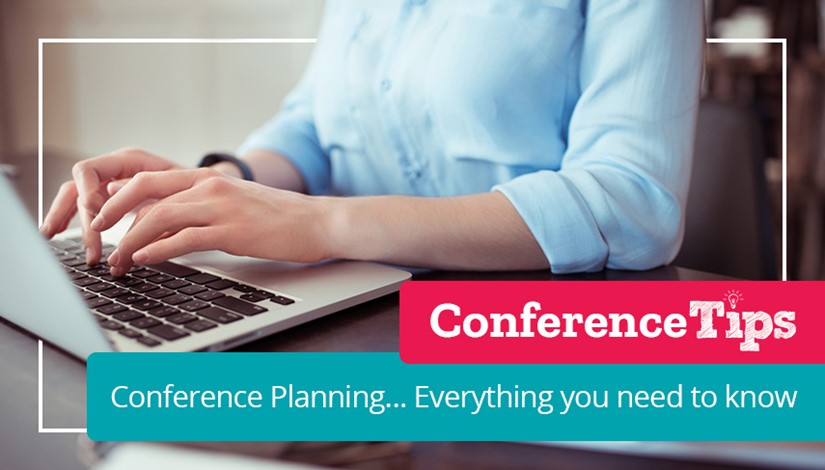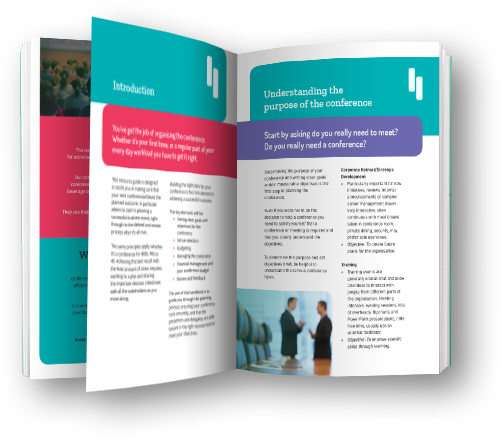
Planning a conference, regardless of its size, is a challenging task. We know, because we’ve helped hundreds of clients do their conference planning for many years now.
Regardless if it’s your first time planning a conference, or if you’ve done it many times before, you’ll always want it to be a success, without it causing you too much stress. To do this you need to make sure you craft and follow a clear plan.
6 Keys to Conference Planning.
We’ve recently re-published and updated our Conference Organiser’s Guide that has invaluable tips for successfully planning a conference. In this article, we’ll look at the 6 keys to conference planning that are outlined in the guide. If you’d like to learn more, you can download a copy of the guide here.
Goal setting
The first key to conference planning is to make sure you have a clear idea of what your conference is about and what goals you would like to achieve with it. Once you can articulate the purpose of your conference, the creating of goals becomes a lot easier. Three types of conference you might be planning are:
- Corporate Retreat/Strategic Development;
- Training; and
- Whole Association.
Each conference will have a primary objective/goal as well as secondary objectives. It’s important to document these early so that you use them as a guide to plan the whole event.
Venue selection
Once you know the purpose of your conference you’ll need to start working on a venue selection criterion. These criteria need to include everything you require from a potential venue for your conference to run smoothly. Some things you need to consider for your criteria are:
- Conference preferred dates;
- Program design;
- Meeting format;
- Social and recreational needs;
- Previous conference history;
- Internal organisational policies;
- Transport for attendees;
- Who’ll be presenting or facilitating your conference;
- The style of the venue;
- The location of the venue; and
- Technical requirements – e.g. projectors, internet access.
Once you’ve matched venues up to your criteria you’ll need to create a short list of venues. From this short list, you’ll need to get proposals and organise site inspections.
Inspecting a venue is one of the most important parts of choosing a venue for your conference. We’ve outlined this important step in more detail in this Conference Tip for Conference Venue Site Inspections.
Budgeting & Financial Planning
A working budget for any conference is crucial to its success. Of course, when dealing with venues and other vendors you will need to gather and compare quotes, but be careful, as all are not created equal. Before comparing the end dollar figure, you need to be sure that each vendor is providing a comparable product/service.
Some unexpected expenses that are often left out of budgets include:
- Facilitator costs;
- Travel costs – both local and international;
- Meals; and
- Printed material.
For more helpful information on keeping a handle on your conference budget read the Conference Tip for Financial Planning for Conferences.
Conference management
For your conference to run smoothly certain aspects of it need to be managed properly to ensure optimum results. They include:
Room Configuration
The configuration of the conference room depends greatly on the style of conference you are running and the way in which information is going to be delivered to your delegates.
We cover this topic in our Conference Tip for Conference Room Configurations.
Accommodation
If you’re running a residential conference you will need to source a venue that will accommodate your number of delegates. You’ll need to provide the venue with a Rooming List that includes what rooms are required and the number people per room.
We cover this topic in our Conference Tip for Conference Accommodation.
Food & Beverages
Food and beverage can make, or break, a conference. Here’s a list of tips to ensure you strike the right balance:
- Keep it simple and set the rules;
- Ask the venue for advice, choose wisely and work to your budget; and
- Ensure special dietary needs are fully catered for.
Debriefing
So, your conference has been planned and ran, you think it has been a success, but you want to know what the facilitators and delegates thought. This is where a debrief and review comes in. It gives you a great opportunity to get valuable information from the people who took part in your conference.
Remember, not all feedback will be constructive or positive in nature. You’ll need to take it all on board to determine if your conference was a success.
To read more about this topic visit this Conference Tip for Debriefing and Reviewing a Conference.
Get Assistance
Conference planning can be an overwhelming responsibility, especially for those who are doing it for the first time. Asking for assistance is not a sign of your failure but rather a sign that you are taking the seriousness of your conference into account. After all, tens or hundreds of thousands of dollars can be spent on an individual conference.
That’s why we’re here to help. As conference specialists, we understand the ins and outs of conferences. We know what works and what doesn’t. And the best part is, our assistance is at no-cost to you!
If you’d like to know how we can help you to organise a successful conference, contact us.

